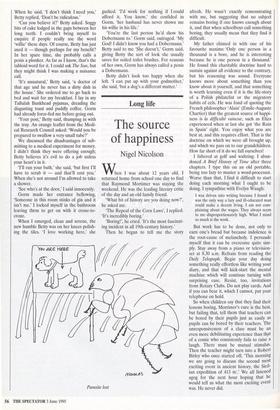Long life
The source of happiness
Nigel Nicolson
When I was about 12 years old, I returned home from school one day to find that Raymond Mortimer was staying the weekend. He was the leading literary critic of the day and an old family friend.
`What bit of history are you doing now?', he asked me.
`The Repeal of the Corn Laws', I replied. `It's incredibly boring.'
`Boring!', he cried. 'It's the most fascinat- ing incident in all 19th-century history.' Then he began to tell me the story Parasite lost afresh. He wasn't exactly remonstrating with me, but suggesting that no subject remains boring if one knows enough about it, and that when schoolboys call something boring, they usually mean that they find it difficult.
My father chimed in with one of his favourite maxims: 'Only one person in a thousand is a bore, and he is interesting because he is one person in a thousand.' He found this charitable doctrine hard to sustain against all evidence to the contrary, but his reasoning was sound. Everyone knows more about something than you know about it yourself, and that something is worth learning even if it is the life-story of a Polish philatelist or the migratory habits of eels. He was fond of quoting the French philosopher 'Alain' (Emile-Auguste Chartier) that the greatest source of happi- ness is la difficulte vaincue, such as Eliza experienced when at last she got 'the Rain in Spain' right. You enjoy what you are best at, and this requires effort. That is the doctrine on which we were all brought up, and which we pass on to our grandchildren. How far short of it do we fall ourselves!
I faltered at golf and waltzing. I aban- doned A Brief History of Time after three chapters. I type this on an old portable, being too lazy to master a word-processor. Worse than that, I find it difficult to start doing each morning what I ought to be doing. I sympathise with Evelyn Waugh: I was driven into writing because I found it was the only way a lazy and ill-educated man could make a decent living. I am not com- plaining about the wages. They always seem to me disproportionately high. What I mind so much is the work.
But work has to be done, not only to earn one's bread but because indolence is the root-cause of melancholy. I persuade myself that it can be overcome quite sim- ply. Stay away from a piano or television- set at 8.30 a.m. Refrain from reading the Daily Telegraph. Begin your day doing something really effortless like writing your diary, and that will kick-start the mental machine which will continue turning with surprising ease. Resist, too, invitations from Rotary Clubs. Do not play cards. And if you can bear it, which I cannot, put your telephone on hold.
So when children say that they find their lessons boring, Mortimer's cure is the best, but failing that, tell them that teachers can be bored by their pupils just as easily as pupils can be bored by their teachers. The unresponsiveness of a class must be an even more debilitating experience than that of a comic who consistently fails to raise a laugh. There must be mutual stimulus. Then the teacher might turn into a Robert Birley who once started off, 'This morning we are going to discuss the second most exciting event in ancient history, the Sicil- ian expedition of 413 sc.' We all listened agog for the next hour hoping that he would tell us what the most exciting event was. He never did.


































































 Previous page
Previous page